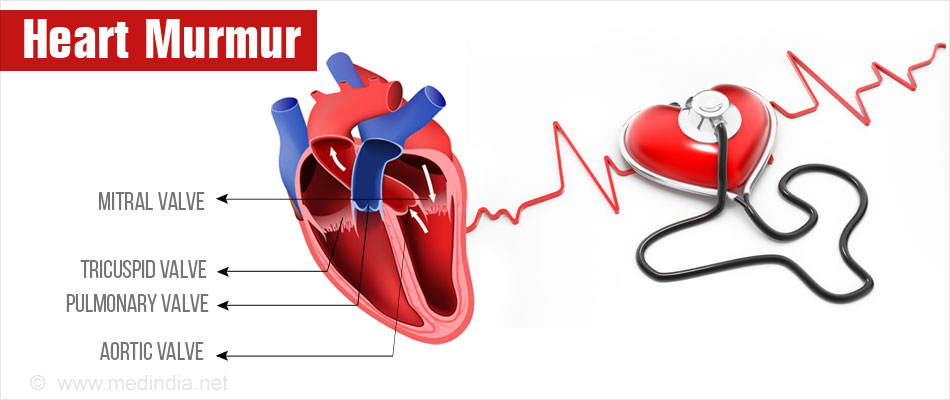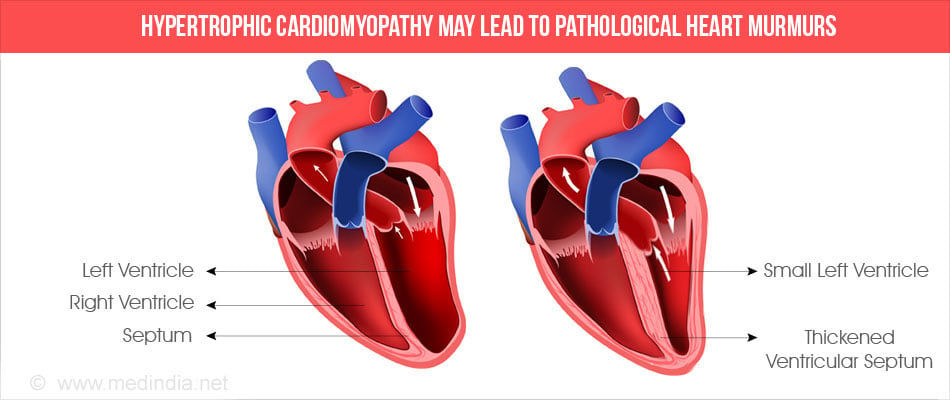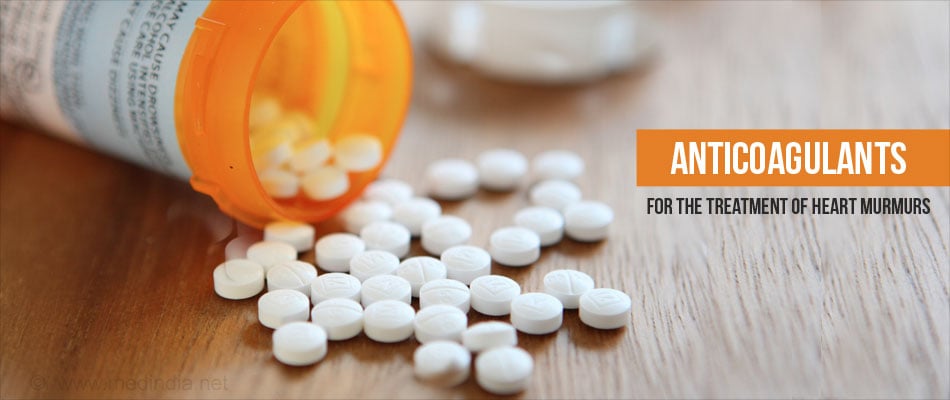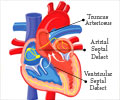- Heart Murmurs - (http://www.mayoclinic.org/diseases-conditions/heart-murmurs/basics/treatment/con-20028706)
- Martins, P., et al., Innocent heart murmurs. Rev Port Cardiol, 2008. 27(6): p. 815-31.
- What Is a Heart Murmur? - (http://www.nhlbi.nih.gov/health/health-topics/topics/heartmurmur)
What is a Heart/Cardiac Murmur?
A cardiac/heart murmur is an extra whooshing sound during heart-beat. The murmur is due to turbulent blood flow in the heart or blood vessels. The cardiac murmur is a clinical sign.
The types of murmurs are:
- Innocent murmurs
- Pathological heart murmurs

Innocent Murmurs:
The murmurs in the absence of any underlying cardiovascular disease are the innocent murmurs.
Pathological Murmurs:
Heart murmurs due to an underlying heart valve disease or congenital heart anomalies are the pathological heart murmurs.
What are the Causes of the Heart/Cardiac Murmurs?
Innocent Heart Murmurs: Innocent heart murmurs occur due to the high volume blood flow. Excess volume of blood is present during pregnancy, so quite often the murmurs in pregnancy are innocent. The innocent cardiac murmurs can also occur due to physical exertion, fever, anemia and hyperthyroidism.
Types of innocent murmur:
- Still’s Murmur/ Precordial Vibratory Murmur: It is due to the change in the blood flow between the left ventricle and the aorta.
- Pulmonary Flow Murmur: The murmur arises from the blood flow between the right ventricle and the pulmonary artery. It is common among children between 8 and 14 years.
- Supraclavicular or Carotid Bruit: The murmur is audible in the area above the collar bone. It is heard near the origin of the brachiocephalic arteries.
- Transient Peripheral Pulmonary Stenosis Murmur: It is due to the turbulence of blood flow, when the blood flows through the pulmonary artery and its branches. It is present in newborns and infants.
- Venous Hum: It is heard in the neck, common in children between 3 and 8 years.
- Mammary Soufflé: It is a continuous murmur heard in some pregnant and lactating women. It is due to increased blood flow in the breast during pregnancy.
Pathological Heart Murmurs:
Murmurs due to an underlying cardiovascular pathology are the pathological heart murmurs. In children, they are due to congenital heart defects and in adults due to heart valve defects.
Congenital Heart Defects:
- The common causes of pathological murmurs in newborns, infants and children are birth defects in the heart valves, heart septa, blood vessels or the heart wall.
- The birth defects result in a disturbance in the normal blood flow. Hence, they lead to a turbulent blood flow and the murmurs.
- Heart valve problem may be due to narrowing of the valves or leaky valves. The narrowed valves cause an obstruction to the blood flow and the leaky valves cause a backflow of the blood.
- The septal defects in the heart also often referred to as holes in the heart cause a diverted flow between the chambers and cause murmurs.
- Congenital heart muscle wall disease leading to hypertrophy of the heart septa and the muscle wall (hypertrophic cardiomyopathy) leads to a flow obstruction and results in a murmur.

Acquired Heart Valve Disorders:
- The acquired disorders which can cause a defect in heart valves are endocarditis, rheumatic fever, age-related degeneration and other heart conditions.
- Heart Conditions: Certain heart conditions like heart attack, heart failure and high blood pressure can cause changes or damage to the heart valve and result in a murmur.
- Age-Related Disorder: As a consequence of aging, calcium or other deposits on the heart valves can cause thickening and stiffening (sclerosis), and it can lead to a disturbance in the normal flow.
- Rheumatic Fever: In case of non-treated or incompletely treated streptococcal throat infection, it can lead to rheumatic fever. It can result in the damage to the heart valves, especially mitral valve. But the valve abnormalities may manifest after many years.
- Endocarditis: An infection of the inner heart layer is endocarditis. It is common in individuals with pre-existing valve problems.
What are the Symptoms of Heart/Cardiac Murmurs?
The symptoms in patients with heart murmur are related to the underlying heart condition and hence, they are variable. The presenting symptoms are:
- Chest pain
- Poor feeding and no weight gain in children with murmurs due to congenital problems
- Dizziness or Fainting
- Cyanosis
- Heavy Sweating
- Chronic cough
- Swelling of the body or weight gain
- Enlarged neck veins
- Breathlessness

How do you Diagnose Heart/Cardiac Murmurs?
The heart murmur is a clinical sign. As many murmurs are innocent, it is essential to differentiate the innocent from the pathological. Also, since the murmurs are due to various pathological conditions, it is necessary to establish the diagnosis to provide appropriate care.
The physical examination, especially auscultation of the heart with a stethoscope has a significant role in establishing the diagnosis. The physician takes the history and evaluates the murmur based on the location, intensity, duration, timing, radiation and aggravating factors. Depending on the need, the physician suggests any of the following investigations which help in the diagnosis.
Electrocardiogram: It helps record the electrical activity of heart. The rate and rhythm of the heart can be detected using ECG. It helps detect heart problems associated with changes in the ECG.
Chest X-ray: The images of the heart, lungs and blood vessels are obtained using the x rays.
Echocardiogram It helps visualize the heart and to estimate the size of the heart chambers and valves. It is useful to assess the blood flow in the heart and across the valves.
Cardiac Catheterization: It is a procedure where a catheter is inserted into the vein or artery in the leg or the arm and advanced till the heart. It helps in the diagnosis of the condition when other tests give inconclusive results.
How do you Treat Heart/Cardiac Murmurs?
The treatment of heart murmur depends on the underlying heart condition. The innocent murmurs do not need any intervention. The causes for the pathological heart murmurs need to be managed.
Medical Management:
Medicines help reduce the symptoms associated with the heart condition and also delay the further advancement of the condition.
Anticoagulants/ Blood Thinners: These are a group of drugs, which prevent the formation of blood clots. Common drugs in this category include heparin, warfarin, aspirin, and clopidogrel.

Diuretics/Water Pills: Drugs, which increase the loss of body fluid in the form of urine. These are useful in patients with excess fluid, which exacerbates the murmur.
Beta Blockers: These drugs block the beta sympathetic activity and help to reduce the heart rate and blood pressure. These are useful in few specific heart valve disorders.
Angiotensin Converting Enzyme (ACE) Inhibitors: These drugs are useful to reduce the blood pressure.
Statins: These are the drugs which reduce the blood lipid levels.
Surgical Management:
The repair of the valve or replacement of the valve is necessary depending upon the condition.
Valve Repair:
Balloon Valvuloplasty: It is performed in the case of valve stenosis. Catheter with a balloon is inserted, and it is guided to the heart. Once, it reaches the valve it is inflated to expand the constricted valve.
Annuloplasty: It is a procedure to tighten the valve with an artificial ring.
Valve Leaflet Repair: The leaflet of the valve is repaired.
Repair of Structural Support: The structural supports of the heart valve are chordae tendineae and papillary muscle. In the case of leaking valves, they are tightened or replaced.
Valve Replacement:
Transcatheter Aortic Valve Replacement (TAVR): It is also called as transcatheter aortic valve implantation.It is a less invasive approach in patients with severe aortic stenosis. The artificial valve is delivered with the help of a catheter.
Open Heart Procedure: In the case of severe aortic stenosis, it is a primary treatment option. The old diseased valve is removed and replaced with a mechanical valve or a tissue valve from cow or deceased human or pig.
How do you Prevent Heart/Cardiac Murmurs?
- Appropriate treatment for streptococcal throat infection can prevent the rheumatic fever induced heart disease.
- A healthy lifestyle can prevent high cholesterol and blood pressure related changes in the heart valves.
- Administering antibiotics as per recommendations in patients with valve diseases before certain procedures like dental extraction is essential.












